Zihan Liang
CSMCIR: CoT-Enhanced Symmetric Alignment with Memory Bank for Composed Image Retrieval
Jan 07, 2026Abstract:Composed Image Retrieval (CIR) enables users to search for target images using both a reference image and manipulation text, offering substantial advantages over single-modality retrieval systems. However, existing CIR methods suffer from representation space fragmentation: queries and targets comprise heterogeneous modalities and are processed by distinct encoders, forcing models to bridge misaligned representation spaces only through post-hoc alignment, which fundamentally limits retrieval performance. This architectural asymmetry manifests as three distinct, well-separated clusters in the feature space, directly demonstrating how heterogeneous modalities create fundamentally misaligned representation spaces from initialization. In this work, we propose CSMCIR, a unified representation framework that achieves efficient query-target alignment through three synergistic components. First, we introduce a Multi-level Chain-of-Thought (MCoT) prompting strategy that guides Multimodal Large Language Models to generate discriminative, semantically compatible captions for target images, establishing modal symmetry. Building upon this, we design a symmetric dual-tower architecture where both query and target sides utilize the identical shared-parameter Q-Former for cross-modal encoding, ensuring consistent feature representations and further reducing the alignment gap. Finally, this architectural symmetry enables an entropy-based, temporally dynamic Memory Bank strategy that provides high-quality negative samples while maintaining consistency with the evolving model state. Extensive experiments on four benchmark datasets demonstrate that our CSMCIR achieves state-of-the-art performance with superior training efficiency. Comprehensive ablation studies further validate the effectiveness of each proposed component.
SMILE: SeMantic Ids Enhanced CoLd Item Representation for Click-through Rate Prediction in E-commerce SEarch
Oct 14, 2025



Abstract:With the rise of modern search and recommendation platforms, insufficient collaborative information of cold-start items exacerbates the Matthew effect of existing platform items, challenging platform diversity and becoming a longstanding issue. Existing methods align items' side content with collaborative information to transfer collaborative signals from high-popularity items to cold-start items. However, these methods fail to account for the asymmetry between collaboration and content, nor the fine-grained differences among items. To address these issues, we propose SMILE, an item representation enhancement approach based on fused alignment of semantic IDs. Specifically, we use RQ-OPQ encoding to quantize item content and collaborative information, followed by a two-step alignment: RQ encoding transfers shared collaborative signals across items, while OPQ encoding learns differentiated information of items. Comprehensive offline experiments on large-scale industrial datasets demonstrate superiority of SMILE, and rigorous online A/B tests confirm statistically significant improvements: item CTR +1.66%, buyers +1.57%, and order volume +2.17%.
InfoGain-RAG: Boosting Retrieval-Augmented Generation via Document Information Gain-based Reranking and Filtering
Sep 16, 2025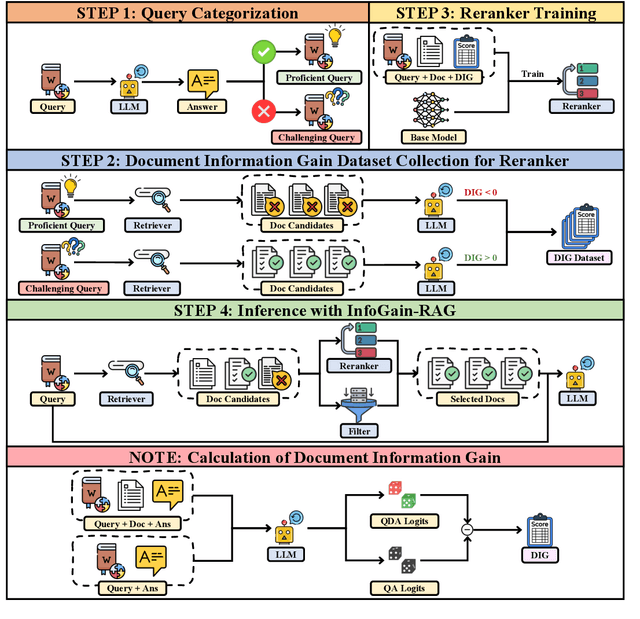
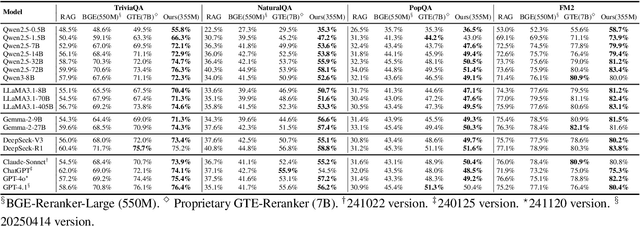
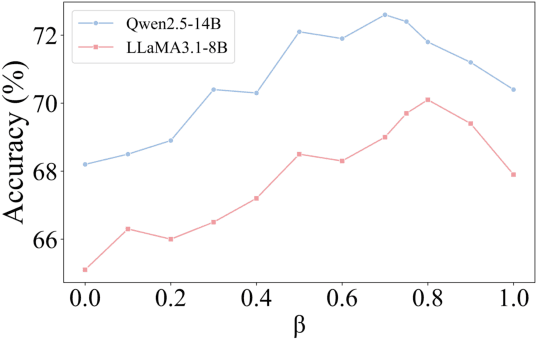
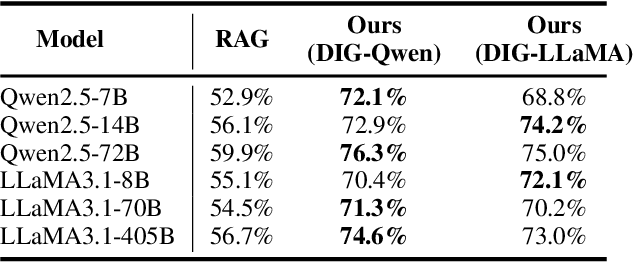
Abstract:Retrieval-Augmented Generation (RAG) has emerged as a promising approach to address key limitations of Large Language Models (LLMs), such as hallucination, outdated knowledge, and lacking reference. However, current RAG frameworks often struggle with identifying whether retrieved documents meaningfully contribute to answer generation. This shortcoming makes it difficult to filter out irrelevant or even misleading content, which notably impacts the final performance. In this paper, we propose Document Information Gain (DIG), a novel metric designed to quantify the contribution of retrieved documents to correct answer generation. DIG measures a document's value by computing the difference of LLM's generation confidence with and without the document augmented. Further, we introduce InfoGain-RAG, a framework that leverages DIG scores to train a specialized reranker, which prioritizes each retrieved document from exact distinguishing and accurate sorting perspectives. This approach can effectively filter out irrelevant documents and select the most valuable ones for better answer generation. Extensive experiments across various models and benchmarks demonstrate that InfoGain-RAG can significantly outperform existing approaches, on both single and multiple retrievers paradigm. Specifically on NaturalQA, it achieves the improvements of 17.9%, 4.5%, 12.5% in exact match accuracy against naive RAG, self-reflective RAG and modern ranking-based RAG respectively, and even an average of 15.3% increment on advanced proprietary model GPT-4o across all datasets. These results demonstrate the feasibility of InfoGain-RAG as it can offer a reliable solution for RAG in multiple applications.
An LLM-LVLM Driven Agent for Iterative and Fine-Grained Image Editing
Aug 24, 2025



Abstract:Despite the remarkable capabilities of text-to-image (T2I) generation models, real-world applications often demand fine-grained, iterative image editing that existing methods struggle to provide. Key challenges include granular instruction understanding, robust context preservation during modifications, and the lack of intelligent feedback mechanisms for iterative refinement. This paper introduces RefineEdit-Agent, a novel, training-free intelligent agent framework designed to address these limitations by enabling complex, iterative, and context-aware image editing. RefineEdit-Agent leverages the powerful planning capabilities of Large Language Models (LLMs) and the advanced visual understanding and evaluation prowess of Vision-Language Large Models (LVLMs) within a closed-loop system. Our framework comprises an LVLM-driven instruction parser and scene understanding module, a multi-level LLM-driven editing planner for goal decomposition, tool selection, and sequence generation, an iterative image editing module, and a crucial LVLM-driven feedback and evaluation loop. To rigorously evaluate RefineEdit-Agent, we propose LongBench-T2I-Edit, a new benchmark featuring 500 initial images with complex, multi-turn editing instructions across nine visual dimensions. Extensive experiments demonstrate that RefineEdit-Agent significantly outperforms state-of-the-art baselines, achieving an average score of 3.67 on LongBench-T2I-Edit, compared to 2.29 for Direct Re-Prompting, 2.91 for InstructPix2Pix, 3.16 for GLIGEN-based Edit, and 3.39 for ControlNet-XL. Ablation studies, human evaluations, and analyses of iterative refinement, backbone choices, tool usage, and robustness to instruction complexity further validate the efficacy of our agentic design in delivering superior edit fidelity and context preservation.
MoDULA: Mixture of Domain-Specific and Universal LoRA for Multi-Task Learning
Dec 10, 2024
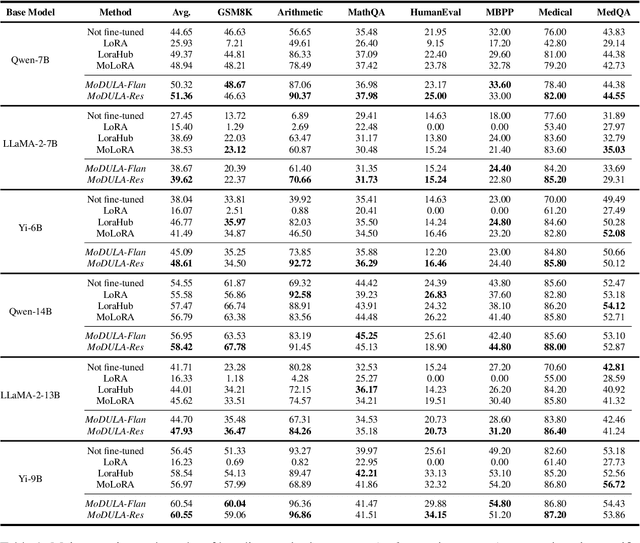
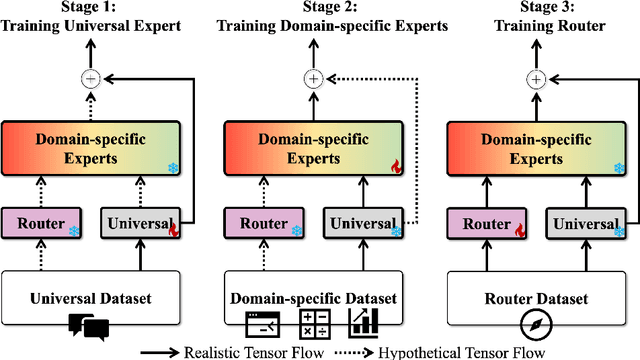
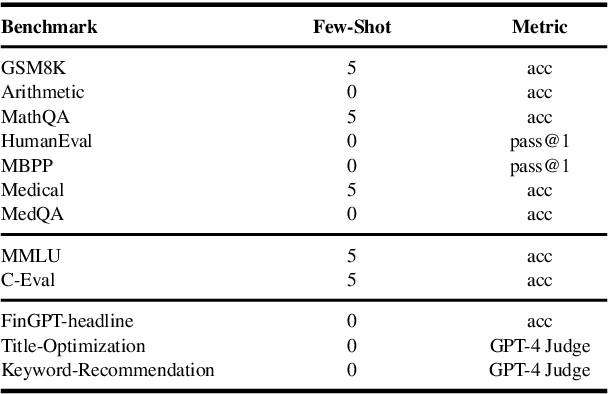
Abstract:The growing demand for larger-scale models in the development of \textbf{L}arge \textbf{L}anguage \textbf{M}odels (LLMs) poses challenges for efficient training within limited computational resources. Traditional fine-tuning methods often exhibit instability in multi-task learning and rely heavily on extensive training resources. Here, we propose MoDULA (\textbf{M}ixture \textbf{o}f \textbf{D}omain-Specific and \textbf{U}niversal \textbf{L}oR\textbf{A}), a novel \textbf{P}arameter \textbf{E}fficient \textbf{F}ine-\textbf{T}uning (PEFT) \textbf{M}ixture-\textbf{o}f-\textbf{E}xpert (MoE) paradigm for improved fine-tuning and parameter efficiency in multi-task learning. The paradigm effectively improves the multi-task capability of the model by training universal experts, domain-specific experts, and routers separately. MoDULA-Res is a new method within the MoDULA paradigm, which maintains the model's general capability by connecting universal and task-specific experts through residual connections. The experimental results demonstrate that the overall performance of the MoDULA-Flan and MoDULA-Res methods surpasses that of existing fine-tuning methods on various LLMs. Notably, MoDULA-Res achieves more significant performance improvements in multiple tasks while reducing training costs by over 80\% without losing general capability. Moreover, MoDULA displays flexible pluggability, allowing for the efficient addition of new tasks without retraining existing experts from scratch. This progressive training paradigm circumvents data balancing issues, enhancing training efficiency and model stability. Overall, MoDULA provides a scalable, cost-effective solution for fine-tuning LLMs with enhanced parameter efficiency and generalization capability.
Contrastive Token Learning with Similarity Decay for Repetition Suppression in Machine Translation
Sep 30, 2024



Abstract:For crosslingual conversation and trade, Neural Machine Translation (NMT) is pivotal yet faces persistent challenges with monotony and repetition in generated content. Traditional solutions that rely on penalizing text redundancy or token reoccurrence have shown limited efficacy, particularly for lengthy article and e-commerce descriptions with inherent redundancy, even with the advent of Large Language Models (LLMs). This paper investigates the underlying causes of textual repetition through the lens of information entropy, attributing the phenomenon to the elevated uncertainty within the input text. To address this, a novel algorithm named Contrastive Token Learning with Similarity Decay (CTSD) is introduced, which modulates the suppression of tokens dynamically, informed by varying attention weights and inter-token distances. Furthermore, an e-commerce dataset comprised of title texts of online real items is compiled and released susceptible to hallucination translations to benchmark the algorithm. Extensive evaluations demonstrate that CTSD significantly outperforms existing approaches in precision and generalizability. Additional online A/B testing underscores its practical value, showing marked improvements in user engagement and conversion. Notably, this method has been implemented with full traffic on eight multilingual sites of alibaba.com, the largest B2B e-commerce platform in the world.
 Add to Chrome
Add to Chrome Add to Firefox
Add to Firefox Add to Edge
Add to Edge